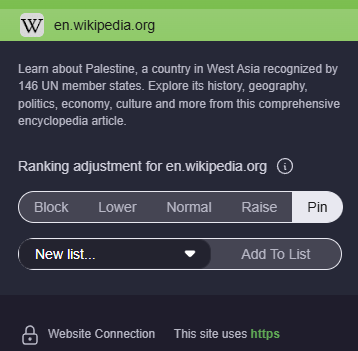Being able to create shareable and modular lists of adjustments to your rankings would be nice for crowdsourcing the labor of curating results.
This builds off my "bug" report and this feature suggestion about marking sites as AI generated together with my experience using Bluesky's Moderation Lists
Note: I know there's Lenses which can be shared, but their functionality is really meant for, as the name implies, very specific and repeated search situations.
Ranking Lists would be groups of adjustments that could be subscribed to and merged into your existing rankings (where your "global" adjustments take priority). This way if it would be possible for people to say highlight a collection of high quality blogs or provide a good starter kit for addressing SEO mills about a topic they follow (programming is obvious, but it easily applies to gardening, cooking, and hobbies generally).
When making an adjustment on the popover there would be a way of adding it to a list (graphic design is, in fact, not a huge passion)

A ranking adjustment could be on multiple lists, but (and I recognize this might be controversial to some people) the adjustment itself would be global to your account. If you're deeming a website useful or not in general it's context shouldn't matter. That's where Lenses would come into play.
Because of that I could see the current Personalized Results settings page continuing to exist but having a way of seeing the lists a domain is on (maybe the same list selection interface as the popover), plus an additional detail page for managing/viewing lists individually. More or less replicating what Bluesky has going on.
Some design thoughts:
- There would need to be a visualization indicating if a modification you've made overwrites something on a list or if a domain was added by a list and not by you
- Conflicts between lists (since it's not just "here's a list, take one specific action" as with Bluesky) would need to be addressed
- It may make sense to limit lists to
Raise and Lower with no Pins or Blocks or making accepting those an option, similar to how Bluesky has Mute or Block subscription types
I'm sure there's a world of technical reasons this would be difficult to implement in the backend, but I think it would be a great addition to the platform!
P.S. the Personal Results settings page uses a Select for the selected adjustment, but the Domain Leaderboard lets you choose using a Radio Button Group